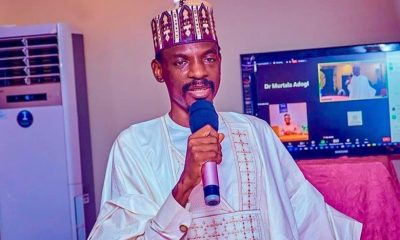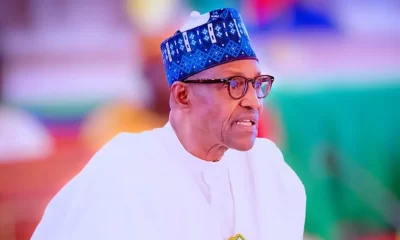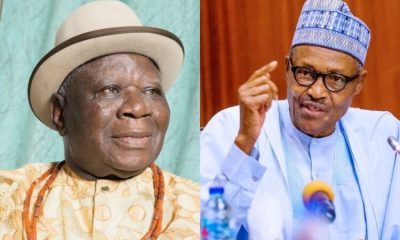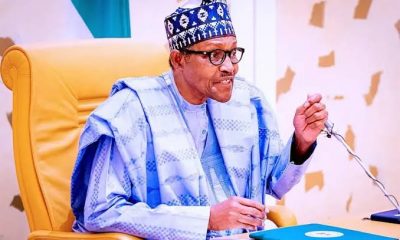Article
Browning the Buhari mystique

By Dan Agbese
The Teflon is wearing off. Actually, it began to wear off before President Muhammadu Buhari left Aso Rock Villa after his two-terms in office on May 29, 2023.
The Teflon is wearing off. Actually, it began to wear off before President Muhammadu Buhari left Aso Rock Villa after his two-terms in office on May 29, 2023. A Daily Trust editorial wandered then where the president, who was supposed to be leading the nation, was when the nation was in existential throes of insecurity and increasing economic difficulties, among other national challenges.
In its editorial of July 22, 2022, “A nation in search of a leader,” the paper spoke about the Buhari model of leadership that spoke poorly of his leadership style. According to the newspaper, Buhari’s style of leadership was amply illustrated by his response to the assault on Kuje Correctional Centre in July 2022: “He gives power and authority to appointees but demands almost nothing of them in return: not performance and not responsibility for non-performance. It is this model of government, this government without governing, this conferral of authority on persons without a corresponding demand for responsibility and accountability, that has brought President Buhari, and the country he leads, to where we are now in Nigeria.”
The Punch, in its editorial of April 28, 2023, “The Buhari years: An era of gross economic fiasco,” spoke ahead of the judgement of history when it said the president’s era had “…witnessed a relentless upsurge in human misery, rising national debt, two recessions, record unemployment and inflation levels, and receding foreign direct investment. While so much had been expected of him, he delivered eight locust years.”
Then the irrepressible Catholic priest, Bishop Hassan Kukah, weighed in with the lamentation that under Buhari’s watch, our “nation was wrapped in desolation. The prospects of a failed state stares us in the face; endless bloodletting, a collapsing economy, social anomie, domestic and community violence, kidnappings, armed robberies, etc. Ours has become a house of horror with fear stalking our homes, our highways, cities, hamlets, and entire communities.”
These views, trenchant for good reasons, speak to our collective disappointment in a man we believed had it all to give his all to the nation and its citizens that needed his all. We believed in his ability to chart a new, progressive course for our nation and its development. We believed that he had the capacity to turn Nigeria from being potentially great to being great. He once told my colleague Soji Akinrinade and me when we interviewed him for Newswatch magazine sometime in 2003, that the “the country is in a mess.” He repeated this at an interview with TheNews magazine in December the same year: “I think this country is in a mess.”
In 2013, he chided President Goodluck Jonathan for his failure to end insecurity in the land. He said, “Jonathan should vacate and give way to a competent hand to govern the country,” for which read, as children like to say, give me, this Otuoke man.” He also said the president had “no capacity for anything.”
Given his brutal dissection of every administration coupled with his relentless struggle to rule Nigeria, first as a military dictator and four times as a democrat, we were inclined to believe he must be the leader we had been looking for, not quite the messiah but probably close enough for a non-Jewish nation. We thought we saw a man who was willing to undertake the dirty task of cleaning up the mess so that this nation under God and Allah and Amadioha, will recover its energy and unite its people for common national causes.
This was why our support for him in 2015 as the only man fit and capable then of fixing our country was near total. It was why an 80-year-old widow in Niger State gave him her life saving of one million Naira as her contribution to his election campaigns.
It was why, after he declared for the presidential race for the fourth time in 2013, I rhapsodised what I called “The Buhari Phenomenon” in a two-part column here and elsewhere. I wrote: “In entering the presidential race for a record fourth time, General Muhammadu Buhari could not have expected he would become a phenomenon in our national politics. He has. This fact has crept up slowly on the nation. …. He has offered nothing but his credentials as an incorruptible and competent leader with the sole objective of fixing his badly broken country.”
So, we took a bet on the general. To retell a stale story, in 2015, the people gave him the vote. In his inaugural speech at his swearing in on May 29, 2015, the newly crowned president pledged to be a Nigerian president for all Nigerians. He said, “I belong to everybody, and I belong to nobody.”
He then went on to talk about the “enormous challenges” the country faced. He said: “Insecurity, pervasive corruption, the hitherto unending and seemingly impossible fuel and power shortages are the immediate concerns. We are going to tackle them head on. Nigerians will not regret they have entrusted national responsibility to us. We must not succumb to hopelessness and defeatism. We can fix our problems.”
Words the people wanted to hear; a promise they could believe in. Buhari offered the nation a welter of mouth-watering promises. Someone has calculated there were ten of them. But he ran on three critical promises, namely, the economy, corruption, and security. It was easy to believe him because in his outing as a dictator in 1984, these were some of the critical problems the nation faced and the reason he and his fellow coupists “…dutifully intervened to save the nation from imminent collapse.” Of course, Nigeria did not face imminent collapse but disputing that now is academic, as in sterile.
It is the ambition of all leaders to leave their nations in a much better shape than they found them. The indices of change would include but are not limited to a healthy and robust national economy with industries humming and food at affordable prices in abundance; corruption at its minimum level possible and not as a way of life; and a nation of laws, not of men in which human lives are sacred and precious and fully protected by the state.
It may be unfair to entrust the enormity of critical changes to only one just because he wears the leadership sash. But history has enough instances to show that it took one man, not a multitude, to plant the seeds that turned their nations back from the sunset to the sunrise. It has been seven months since the man acclaimed by his acolytes as the new sheriff in town, left town.
Pundits will take Buhari up on his three major promises – the economy, corruption, and insecurity. Their views are not kind. The town left by the sheriff is a country burdened much more by the burdens he promised to fix. The browning of the Buhari mystique presents us with interesting facts about our leadership recruitment process, to wit, the groundless belief that our leaders at all levels of government are God-sent.
This prevents us from asking rational questions that in the normal cause of human development, should protect us from human failings and poor judgements. We were drawn to Buhari by his mystique that clearly exaggerated his capacity and competence. Part of the Buhari mystique was that we did not know him. We assumed we did. The larger part of that mystique was that he came into office as a packaged product, encrusted with a shiny Teflon. We mistook the packaged product for the real thing.
Mohammed Bello Adoke, former attorney-general and minister of justice in the Goodluck Jonathan administration, said the Buhari administration “…was, without a doubt, the most incompetent government this nation has ever witnessed. It was helmed by the most incompetent president Nigeria has ever had and will hopefully never have again. It was run by political incompetents.”
His successor, President Bola Tinubu, is complaining that he inherited a mess (his word) from Buhari. He is saddled with Buhari’s legacies of a broken national economy, a nation overwhelmed with insecurity and separatist agitations that grate on our ears.
The vice-president, Senator Kashim Shettima, told the presidential committee on fiscal policy and tax reforms, that the economy was in a “mess.” He said, “I hope you will come up with a roadmap to salvage our nation. We are in a big mess. This is a great nation chained by poor governance, chained by many challenges…” (To be concluded)


















